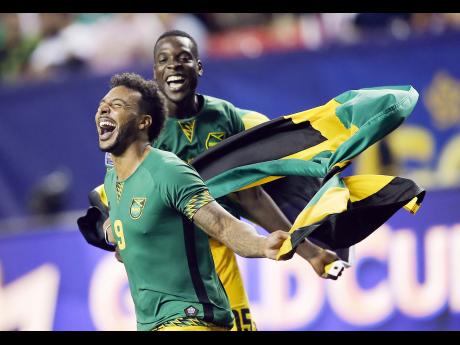Longevity made ’98 team better, says Oral Tracey
Comparisons between the current Reggae Boyz, who finished second in the CONCACAF Gold Cup and the 1998 team that qualified for the World Cup Finals in France continue to crave the indulgence of local football fans.
It is always difficult, if not impossible, to credibly compare sports teams across eras. But I would easily rate the 1998 World Cup qualifying team as better because it performed at a high level over a longer period of time, since consistency is such a crucial index of true quality.
This 2015 team basically won the Caribbean Cup, played in the Copa America, and then had a dream run in this year's Gold Cup, all within a one-year stretch. They were hardly outstanding before then and we don't know what they will do going forward. We must also never lose sight of the fact that the 1998 bunch actually qualified for the World Cup finals and went on to beat Japan at the showpiece event.
The case that the current team is better than the 1998 team is hinged on the claim that more players in the 2015 team are playing or have played at a higher level than the players in the 1998 team.
FLAWED PREMISE
That is a flawed premise for the simple reason that a better group of players does not necessarily translate into a better team.
It is much more about how effectively and efficiently each group functions as a unit and not about which player played at which club, or in which league. So the fact that Adrian Mariappa, Wes Morgan and Michael Hector currently play in the EPL or in League One in England, while Ian 'Pepe' Goodison, Durrent 'Tatty' Brown and Linval 'Rudi' Dixon played for local clubs does not mean they were superior as a functional unit.
The consensus seems to be that the two teams, at their best, pretty much cancel out each other in terms of defensive organisation and tenacity but, again, in terms of formation and structure the 1998 team was more difficult to breach in that they played with a sweeper in 'Tatty' Brown and a ultra-defensive central-defensive midfielder in Peter Cargill.
The 2015 team plays a flat back four, with a central-defensive midfielder in Rodolph Austin, who ventures into attack much more that the average central midfielder.
Therefore, comparing both teams in their area of strength, defence, the 1998 team was a better functional unit.
I think the idea of comparing goals conceded between the two eras would also be subject to ridicule because, again, all things do not remain constant and equal. The 1998 team had to contend with playing in the Azteca stadium in Mexico City not once, but twice in the campaign, where it was not unusual to concede upwards of five and six goals per game. This team never had to visit the Azteca and a rampant Mexico team during this their dream run.
With the midfielders basically cancelling out each other and let's say, team unity and camaraderie are equal between both teams, there are two big differences that make the 1998 team better.
One is the presence of X-factor players such as Walter Boyd and Andy Williams, and even Deon Burton, who all provided game-changing moments of individual brilliance along the campaign, which, when combined, eventually propelled the team to the World Cup Finals.
The current squad, by comparison, is lacking in X-factor players.
The other big difference between the teams is leadership. Austin is the clear leader of the team and even with Morgan, who is the captain of an EPL team, the 2015 team is thin in leadership. The 1998 team was blessed with strong leaders throughout. Warren Barrett was the official captain but, in 'Pepe' Goodison, 'Tatty' Brown, 'Rudi' Dixon, Fitzroy Simpson and Cargill, were all extraordinary leaders of men. That 1998 team was basically a team of leaders.
When all is said and done, I think nine times out of 10, the 2015 team would not score on the 1998 defensive unit.
While the 1998 offensive unit with the skill and brilliance of Boyd, in tandem with the tenacity of Burton and Paul Hall, I think the World Cup qualifying team of '98 would find a way to score when it mattered most and win against the 2015 team. In such a case, the better team would have won.

